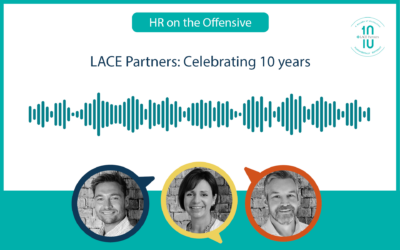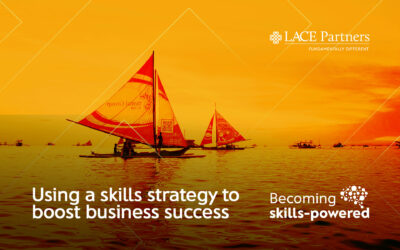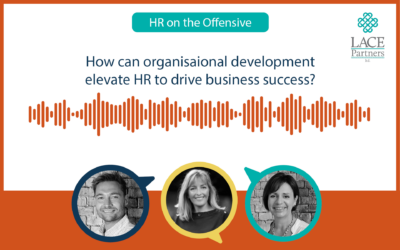In 2020 the team at Culture Amp produced Hindsight is 2020, a report analysing the emergency response feedback surveys produced for customers during the pandemic. Chris and Emma from LACE Partners recently sat down with Melissa Paris, Lead People Scientist at Culture Amp, to get her take on the results now that we are well in to 2021. Has much changed since they released the results? Read below or listen to the discussion on our HR on the Offensive podcast here.
Are leaders still stepping up in 2021?
In the Hindsight is 2020 report there was a 4% increase in engagement during the height of the pandemic. Very early on in 2020 we started to see anecdotal evidence of an increase in employee engagement, which was a surprise because we didn’t really know what to compare that experience to. Upon reflection however, you can challenge the assumption that what we were seeing was a reaction to an unprecedented event as there are instances that you can compare what we saw in 2020. For example, the way organisations respond to natural disasters, financial disasters and other times of crisis.
Reflecting on how people typically respond in those environments enabled us to start to model our response. Our people scientist team looked at an approach first highlighted by the Washington State Department of Health which suggested that although people inevitably feel anxiety as a pandemic starts, it can very quickly change and become a type of ‘honeymoon period’. People ‘band’ together to fight and respond, which is what the data from our customers showed.
Leadership was an aspect in which we saw an increase in confidence from employees. We ran a question which asked to validate the statement “the leaders in my company keep me informed about what is happening”, which saw an increase of 13% compared to pre-pandemic. Furthermore, the statement: “the leaders at my company demonstrate that people are important in my company” increased by 9%. This indicates that many leaders took the opportunity during this period to be more open and more vulnerable with their employees, which had a positive outcome for engagement.
So how can organisations harness these changes in leadership behaviour as this period of ‘return to normal’ is now upon us? And what impact does this have on developing the leaders of the future who will not have gone through the last 18 months?
Stretching leadership muscles and communicating with passion and transparency was a central theme in 2020 and into 2021. Now it’s about how you can keep those ‘leadership muscles’ toned to reap the rewards this will bring moving forward. Being authentic as a leader is now vital, but when selecting the leaders of the future, how can you measure this authenticity? Some individuals will naturally have that ability, but others may need to be coached on such an intangible leadership trait.
Did you find work/life balance?
For many the answer to this was ‘no’. What the Culture Amp survey and blog illustrated was that whilst many employees gained flexibility, remote working meant that some employees could not switch off. In our trend data there were only three of 60 questions asked where we saw a negative ‘decline’ in the data and one of those questions was ‘I’m able to arrange time out of work when I need to’. Even now as we reach the latter stages of 2021 we are still seeing individuals struggle to find that balance. For many the pandemic saw some employees having to do more with fewer resources, as furloughed workers impacted the workload of still working, coupled with budget cuts and redundancies. This compounded pressure on employees and in some instances we saw ‘survivors guilt’, further impacting employee wellbeing. The outcome is that businesses now understand how important it is to protect the psychological health of their employees, but how well are they doing?
Many companies are stepping up. They are experimenting with ways to prioritise wellbeing, re-thinking holidays, thinking about what they can do as organisations and also what individuals can do. What has worked well is focusing on recognising great work – outside of formalised systems – and increasing the level of continuous feedback to show employees that they are valued. What is also crucial is to provide line managers with the right level of training so they feel comfortable in supporting their teams and in driving forward company approaches to wellbeing. Important aspects include ensuring employees can set adequate up boundaries so they can truly switch off after work, underlining the responsibility of line managers and senior managers in enforcing this.
For some organisations this is more of a challenge than others. The culture that your business has will impact how easy or hard it is to execute. We’ve all heard about ‘The Great Resignation’ and organisations that haven’t made a conscious effort to accelerate their approach to wellbeing are likely to get caught out in the battle for talent. Listening to what your employees want is key.
HR bearing the brunt of emotional labour
HR teams have been on the front line of the pandemic and how it is impacting businesses. It is not just the emotional challenges the workforce was feeling, but also the logistics and practicalities of solving complex problems in tight timeframes. Helping employees through grief, redundancies, and other challenges became intensified during the pandemic. At Culture Amp we have leaned into this concept of ‘HR for HR’. It is important for us to be able to talk to our clients to show them that we are there for them, we can be a sounding board, we can support. But organisations also need to play their part and recognise that they have a role to play in helping the HR team out.
There will soon come a time in which we are out of this post-pandemic world and the ‘true normal’ is upon us. Organisations will be changing and growing and there will be a need to ensure that the HR team is equipped to support that growth. So ensuring that you don’t have a HR team on the verge of that burnout is essential and organisations of all sizes should be mindful of that over the next six to 12 months.
If you’d like to talk to the team at LACE Partners about some of the challenges bought about in today’s blog, please feel free to contact us here. If you’d like to talk to Melissa about the work the team at Culture Amp do, then reach out and connect to her on LinkedIn.






